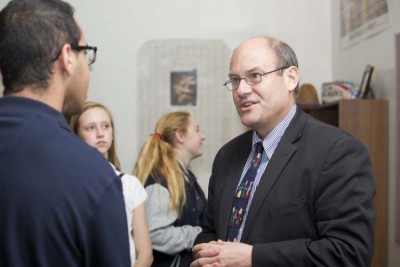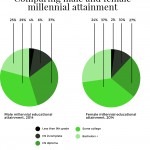
Americans for Peace and Tolerance, a non-profit organization that encourages “peaceful coexistence in an ethnically diverse America,” according to their website, criticized the Boston University-affiliated program Axis of Hope Thursday in a YouTube video, alleging that AOH imparts political statements on students.
Founded by School of Education clinical instructor Carl Hobert in 2002, AOH teaches conflict resolution and negotiation skills to middle and high school students.
The video focuses on a BU-affiliated workshop held at Weston High School in May 2013 called “Whose Jerusalem.”
“Carl Hobert paints grandiose scenarios as a way to motivate and recruit students to his brand of political activism,” the video states. “These scenarios ignore the complex and messy real world. Axis of Hope promotes simplistic and naive approaches toward resolving complex international conflicts and exploits idealistic students to promote a political agenda.”
Hobert said his intentions are sincere about raising global awareness in young people.
“I founded Axis of Hope as a non-profit because I wanted to teach students two main concepts: conflict resolution and negotiations,” he said. “So to have a ‘political agenda’ is definitely off-key. The whole idea here is to have students, whose walls are already down in their own schools … look at the issues and decide.”
Hobert said APT contacted him about an interview for the video, but he declined.
“I calculated and thought they’re filming and producing this film,” he said. “If they film me, then they’re able to take little sound bites and do what they want and it’s going to add more legitimacy to their argument that I’m crazy, that I’m very pro-Palestinian.”
In the workshop that is the subject of the video, students were divided into groups that represent three groups involved in the Middle East conflict, including Hamas and Fatah, the Likud National Liberal Party and the Israeli Labor Party, and an outside party made up of the Arab League and the Quartet on the Middle East, which includes the United States, United Nations, European Union and Russia.
APT states in the video that students aren’t being taught the right way to address the conflict.
“Instead of teaching students how to understand the complex, hundred-year old conflict between Arabs and Jews, Axis of Hope is encouraging teenagers to come up with political solutions based on misleading teaching materials,” the video states.
Students work together to develop plans to improve relations between all of the parties, Hobert said. They address issues such as security, sovereignty of the holy site of Jerusalem and settlements of land.
“One by one, a representative for each group gives the summary statement,” he said. “Think about that. That whole process is negotiation. What are you going to say? How do you agree on the summary? Who’s going to speak? Who’s the secretary? That’s all important negotiation.”
Hobert said the criticism against AOH presents a teaching opportunity.
“I am now trying to decide how I’m going to respond,” he said. “The word ‘listen’ — something I teach in workshops — spelled another way is ‘silent.’ Spelled a third way, it’s ‘enlist.’ I try to teach that in conflict-resolution workshops. I try to get students to listen more by being silent so they get the ideas of other sides. That enlists students not into being pro-Palestinian, but into having a better view of the world.”
Danny Hochberg, president of BU Students for Israel, said he is not offended by AOH’s efforts, so long as students are allowed to maintain the beliefs they came in holding.
“If you separate someone from their beliefs in order to learn about another side, that’s fine, as long as you do both sides,” said Hochberg, a junior in the Questrom School of Business. “If the program is talking about conflict resolution, you have to do both sides. Putting someone on the Arab side simply because they’re Jewish doesn’t make much sense unless you’re really exploring both.”
Hochberg said when discussing this controversial topic, whether in a middle school or on a college campus, it is imperative to create a safe space for dialogue.
“It’s important to make sure you’re in a safe environment because a lot of people feel threatened when discussing these issues,” he said. “You can have all the discussion you want, but if you’re not in a safe environment then what’s the point? I’m all for dialogue, and I’m a big supporter of listening to the other side.”





Carl Hobert is a deceptive con artist. Stay away from him at all costs.